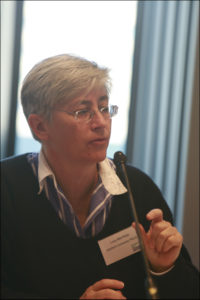360Giving showcased on global Digital Impact roadshow
Last month 360Giving took part in the Digital Impact global roadshow that has been to Asia, America, India, Australia and Europe bringing together stakeholders working on issues related to digital civil society. Here Lucy Bernholz ‘philanthropy wonk’ and director of The Digital Civil Society Lab, who is leading the Digital Impact series, reflects on the London event and how data and digital literacy can deliver democracy and peace…
The Digital Civil Society Lab at Stanford University’s Center on Philanthropy and Civil Society is working with local hosts and partners in 10 cities around the globe this year to learn about the shape and challenges for civil society organizations these contexts. On June 16, in partnership with the Data Science Institute of Imperial College the event series came to London. Sixty participants from government, nonprofits, foundations and other funders, digital rights activists, scholars and data scientists spent a day articulating UK perspectives.
The agenda included discussions of digital dependencies – how can civil society organizations manage and govern the digital data and infrastructure on which each sector depends in ways that align with civil society’s values?
Recognizing that digital data are now a core resource for the sector is the first step – singular pilot projects and one-off attempts at sharing across sectors are no longer enough. Several UK examples of moving beyond the pilot were presented, including the justice data lab of NPC, the shared data platforms and tools being hosted by 360Giving, and efforts to imagine new forms of nonprofits, purpose-built for data, such as Civic Trust or Feedback Commons.
Participants from all sectors agreed that the state of digital literacy is too low. Few of us have understood the distinguishing characteristics of digital data or the political economy of digital infrastructure in ways that enable smart organizational or policy decisions. While not unique to the UK, these challenges are of national political interest at the moment, as became clear during discussions of the Conservative party’s manifesto and the role of the EU General Data Protection Regulation, set to come into effect in May 2018.
To the question ‘what is the potential prize for a digitally/data literate Civil Society’, I would say a functioning digital civil society equals functioning democracies and peace. Seriously. That’s what’s on the line.
More details of the London Digital Impact Event can be read here.
Prior to arriving in London the Digital Impact team had held a similar event in Brussels and then they moved on to Berlin. Documentation of the events, including Idea Boards, session videos, and individual interviews is being shared here.

